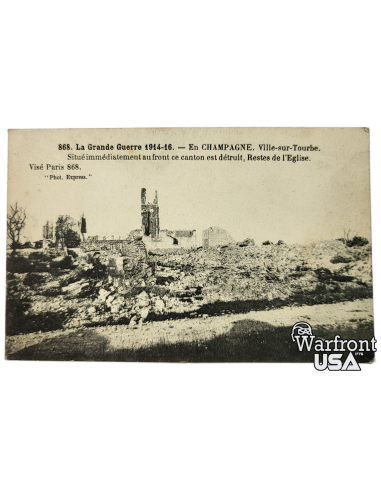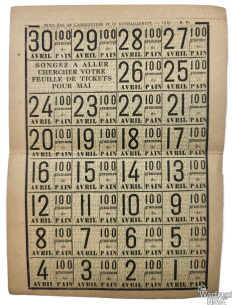A black and white photograph capturing the devastation of war, showing a destroyed building and the remnants of a church in Ville-sur-Tourbe.
Title: "868. La grande guerre 1914-16- En Champagne. Ville sur tourbe. Situé immédiatement au front ce canton est détruit, Restes de l'Église vise Paris 868. 'Pho. Express'", translating to:
"868. The Great War 1914-16- In Champagne. Ville-sur-Tourbe. Located immediately at the front, this area is destroyed, Remains of the Church aimed at Paris 868. 'Pho. Express'"
This inscription details the location, the context of destruction due to being on the front line, and specifies the church as a focal point of the image. "Pho. Express" likely refers to the photo agency or photographer.
No written message, suggesting this card was either never used for mailing or preserved as a historical artifact.
Marked as "Carte Postale" with spaces for "Correspondance" (Correspondence) and "Adresse" (Address), left blank.
Ville-sur-Tourbe in the Champagne region was close to the front lines throughout much of WWI, suffering significant destruction. This card captures the church's remains, symbolizing the cultural and spiritual devastation of war alongside physical destruction.
Condition: Exhibit signs of aging like fading of the photograph, wear along the edges, or minor damage from handling or storage.
Historical Significance: A poignant piece for collectors of WWI memorabilia, those interested in French history, or the study of war's impact on cultural landmarks. It's a direct visual testimony to the extent of damage in frontline towns.
Offers a stark reminder of warfare's toll on places of worship and civilian infrastructure, providing a concrete example for discussions on war, peace, and historical memory.
Note: This postal card serves as a somber record of WWI's destructive power on both the physical and spiritual landscapes of France. It's not just a collector's item but a piece of history that invites reflection on the cost of conflict and the resilience of communities.





































